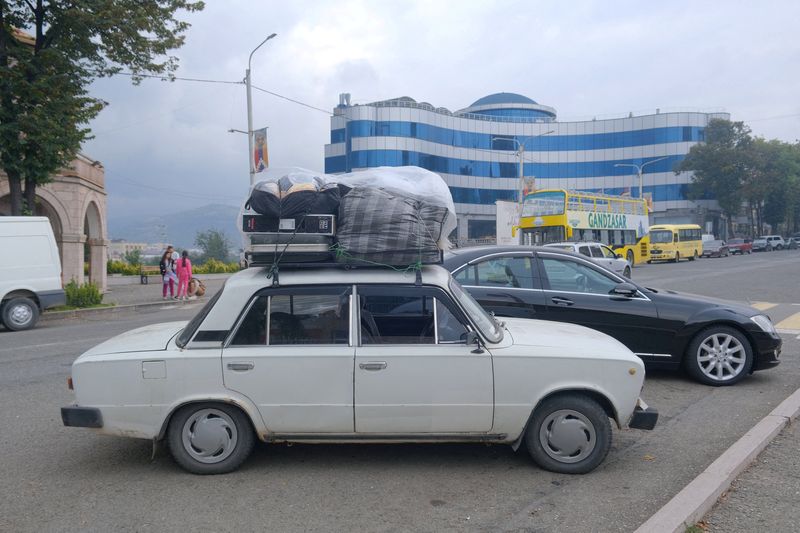By Felix Light
GORIS, Armenia (Reuters) - For the second time in his life, Samvel Alaverdyan is fleeing Azerbaijan.
Born to an ethnic Armenian family in the capital Baku, Alaverdyan first left as a child in 1989 when violence broke out between Azeris and Armenians over the breakaway territory of Nagorno-Karabakh.
Now he has escaped from Karabakh itself, where Azerbaijan mounted a lightning offensive last week to end three decades of de facto independence for the 120,000 ethnic Armenians who lived there.
Many of the population are now fleeing in fear, gathering their belongings in plastic bags and boarding cars and buses that are jamming the only road from Karabakh into Armenia.
"It’s a nightmare,", Alaverdyan said, sitting with his wife Monika, his 21-year-old son Hayk and his in-laws outside a theatre in the Armenian border town of Goris that is serving as the main processing point for those displaced.
The 45-year-old ex-policeman, who said he had been working as a civilian on a Karabakh Armenian military base, is one of the first Armenians to escape the Karabakh capital of Stepanakert, which the Azeris call Khankendi.
This time around, fleeing is harder.
In 1989, Alaverdyan and his family fled to the Armenian capital Yerevan from Baku, then a multinational Soviet city with a large Armenian minority, after an anti-Armenian pogrom in the nearby city of Sumgait.
Azeri neighbours drove the family to the border in order to protect them. "They were good people," Samvel said. The neighbours also sent on their possessions, and Samvel and his family moved to Karabakh.
'A REFUGEE AGAIN'
This time, they have lost everything.
In Stepanakert, the Alaverdyans lived in a four-room private house with an allotment. That helped them survive harsh food shortages that gripped Karabakh during a nine-month Azerbaijani blockade that started last December.
"I went to Stepanakert, I stayed there, got married, started to build a house. Now I'm a refugee again," Samvel said.
"All we took with us are our coats," said Monika, an accountant, sitting on the pavement next to bags of blankets handed out by volunteers.
The family left Stepanakert overnight on Sunday in their Nissan people carrier, having heard that a column was leaving the city. Now they plan to move to the town of Charentsavan, close to Yerevan, where they have relatives.
Passing the Azerbaijani border guards on the way out was a risk, they said. Samvel has previous military experience with Karabakh forces and his son Hayk was serving in the Karabakh Armenian army until last week.
"We took a big gamble," Samvel said.
Monika said the Azerbaijani border guards identified Hayk as a soldier at the checkpoint, but let them through after checking the car for weapons.
Asked whom they believe to be responsible for the disaster, the family was clear.
"I don’t have much to say about the Azeris," said Monika. “I have a lot to say about the Russians."
Both Samvel and Monika faulted the actions of the 2,000-strong Russian peacekeeping contingent who deployed to Karabakh after a 2020 war between Azerbaijan and Armenia. They said that before the conflict they had had warm feelings for Russia, and had studied in Russian-language schools.
Both said the Russians had demanded bribes to take civilians out of Karabakh during the blockade, something Reuters was unable to verify.
"Of course, it's their fault", said Monika. "When they came in 2020, we thought they'd protect us."
Christian Armenians have historically looked to Moscow to protect them from their mainly Muslim Azeri and Turkish neighbours.

On Monday, Kremlin spokesman Dmitry Peskov said Russia still considers Armenia its ally but he rejected Armenian attempts to blame Moscow for the situation in Karabakh.
Russia will work on ensuring that the rights of ethnic Armenians in Karabakh are respected, Peskov added.